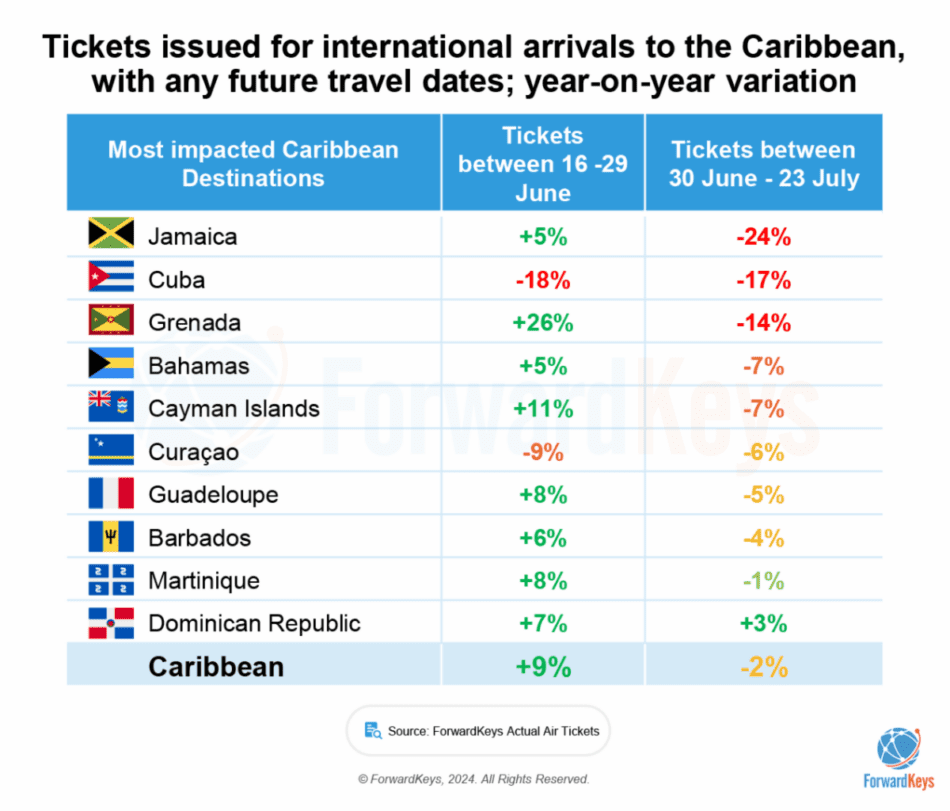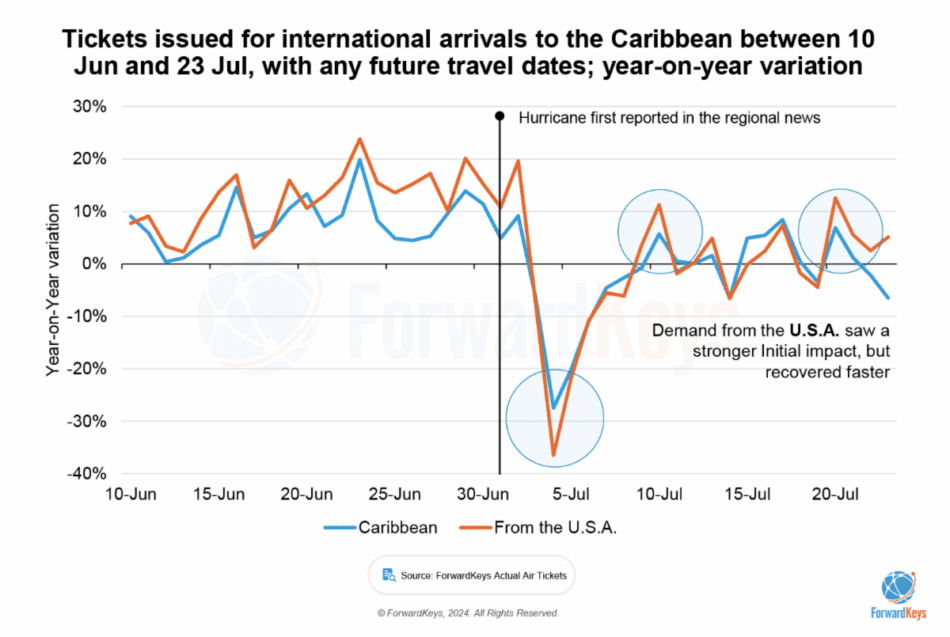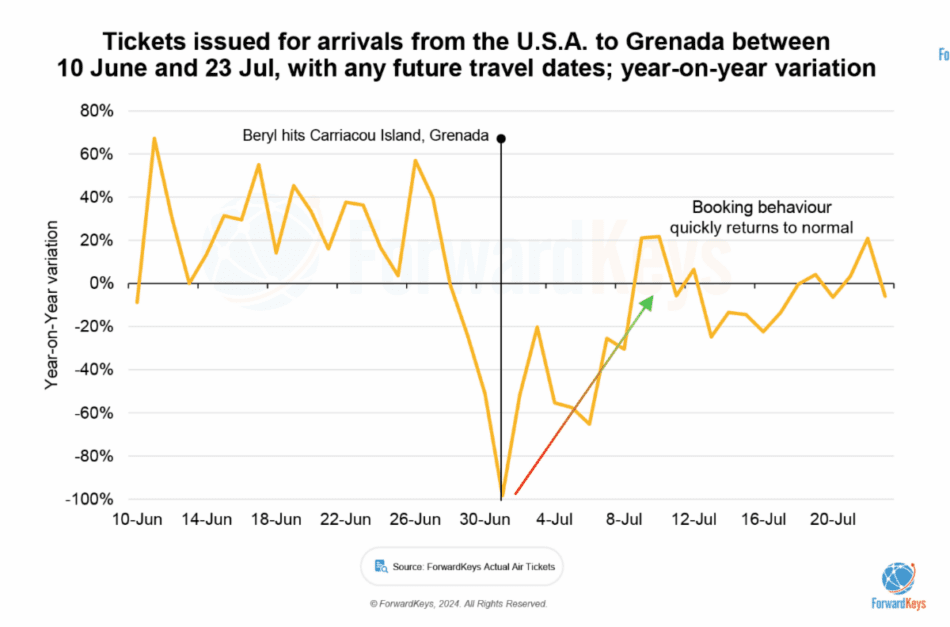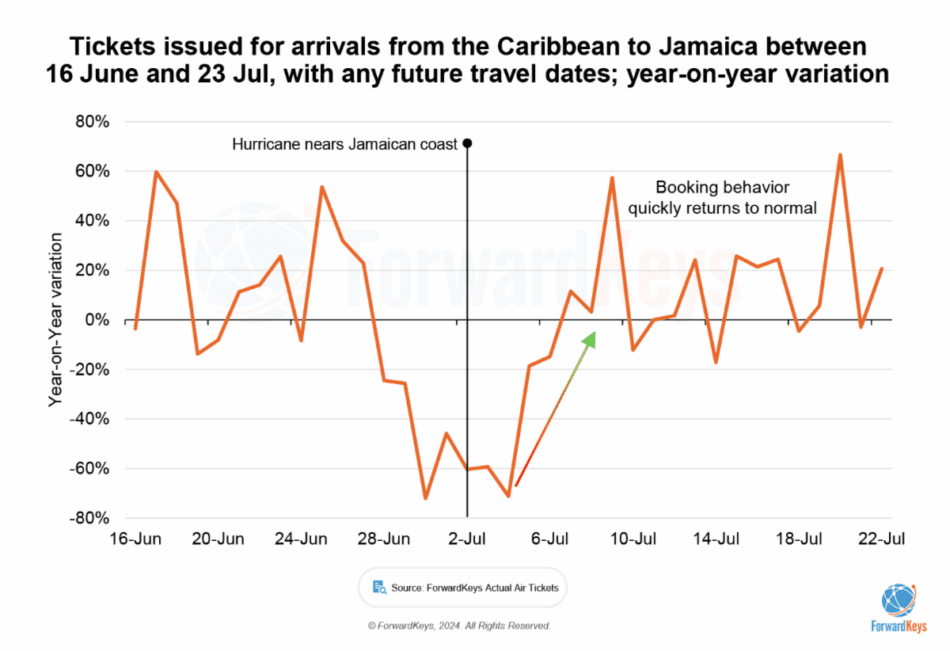Caribbean Tourism Demonstrates Resilience with Rapid Recovery


Olivier Ponti, Director of Intelligence and Marketing, ForwardKeys
Source: Caribbean Hotel and Tourism Association

Nicola Madden-Greig, President, Caribbean Hotel and Tourism Association (CHTA)
FORT LAUDERDALE, Fla. (August 2, 2024) – The Caribbean tourism industry has shown extraordinary resilience in the wake of Hurricane Beryl, with data revealing a rapid rebound in travel bookings. Despite the initial impact of the storm, which made landfall as a Category 4 hurricane in the Grenadines on July 1, the region has experienced a remarkable turnaround, driven particularly by its largest market, the United States.
Comprehensive air travel data from ForwardKeys, analyzed in collaboration with the Caribbean Hotel and Tourism Association (CHTA), reveals a swift rebound in tourism, most notably from the United States. While analysis of data is ongoing with results to be shared in a future report, the overall trend shows the Caribbean’s impressive ability to recover and adapt.
Short-term Drop in Caribbean Bookings

While there was a short-term decline in Caribbean bookings immediately following the storm, the recovery has been impressive. Analysis of air tickets issued between June 30 and July 23 shows a modest 2% drop compared to the same period in 2023. Destinations which were in the storm’s direct path saw more pronounced falls, such as Grenada with a 14% decline and Jamaica with a 24% drop. Notably, the period leading up to the hurricane saw a 9% increase in bookings across the Caribbean, demonstrating strong pre-storm travel interest. During that period, Jamaica recorded an 5% increase while Grenada recorded an impressive 26% rise.

U.S. Market Leading the Recovery
The U.S., which is the largest source market for the Caribbean, has shown encouraging signs of a swift recovery. Starting from July 9, ticket sales from the U.S. to the Caribbean have returned to year-on-year growth, marking a faster recovery compared to the overall average. This is particularly significant given that the U.S. initially saw a decline of 36% immediately after the hurricane, highlighting the resilience and ongoing appeal of the region.
Grenada feels the impact but rebounds quickly
Grenada, one of the islands directly impacted by the storm, has shown a remarkable recovery.
Although intra-Caribbean ticket sales fell 23% and bookings were down 18% from key U.S. markets such as Boston (-19%), Miami (-18%) and New York (-15%), Grenada’s market has quickly bounced back to near-normal levels.

Booking patterns have shifted, with last-minute trips to Grenada from the U.S. in July seeing a 51% increase in cancellations due to the hurricane disruption. However, cancellations for trips from August onwards were less impacted, rising by 6%. The dramatic rebound is particularly significant given the initial challenges, with key segments like Business and Visiting Friends and Relatives (VFR) showing notable growth of 57% and 12%, respectively, since July 2.
Jamaica and Regional Recovery
Bookings to Jamaica from elsewhere in the Caribbean have followed a similar pattern as Grenada and the region as a whole, with a swift recovery to 2023 levels suggesting the initial hurricane impact was short-lived and traveler confidence was restored within a matter of days.

Olivier Ponti, Director of Intelligence and Marketing at ForwardKeys, commented: “ForwardKeys’ comprehensive travel intelligence clearly shows the significant short-term impact that Hurricane Beryl had on travel to the Caribbean, particularly to those islands in the direct path of the storm. However, the speed of the recovery is a highly encouraging sign of the resilience of the region’s tourism economy. The U.S. market, which is so critical for the Caribbean, is leading the way, while segments such as group travel and VFR are rebounding more strongly as humanitarian and essential travel pick up pace. While there was an immediate and severe hit to bookings, we are seeing a normalization to 2023 levels across the region, which bodes well for the remainder of the season.”
“While the impact of Hurricane Beryl was felt directly in the affected destinations – St. Vincent and the Grenadines, Grenada, Carriacou and Petite Martinique, and South Coast of Jamaica – as well as indirectly in other islands in the region, it’s crucial to remember that the Caribbean is vast. While travel to affected areas temporarily decreased, numerous destinations untouched by the storm remain fully operational and open for business. Moreover, the swift rebound in bookings from the U.S., our largest source market, underscores our region’s enduring appeal. This rapid recovery not only highlights our industry’s resilience and strength but also reaffirms our unwavering commitment to overcoming challenges,” remarked Nicola Madden-Greig, President of CHTA.
About the Caribbean Hotel and Tourism Association (CHTA)
The Caribbean Hotel and Tourism Association (CHTA) is the Caribbean’s leading association representing the interests of national hotel and tourism associations. For more than 60 years, CHTA has been the backbone of the Caribbean hospitality industry. Working with some 1,000 hotel and allied members, and 32 National Hotel Associations, CHTA is shaping the Caribbean’s future and helping members to grow their businesses. Whether helping to navigate critical issues in sales and marketing, sustainability, legislative issues, emerging technologies, climate change, data and intelligence or, looking for avenues and ideas to better market and manage businesses, CHTA is helping members on issues which matter most.
For further information, visit www.caribbeanhotelandtourism.com.
About ForwardKeys
Founded in 2010, ForwardKeys has pioneered the way forward for tourism organizations, hotels, and retailers keen to understand who is travelling where, when, and for how long. We’ve managed to share such information by having the most comprehensive ticketing data covering the globe from online bookings to travel agencies and airlines. From ticketing data to Seat Capacity and Total Air Market (TAM), the variety of datasets means you get a 360-degree view of the real travel ecosystem. Equipped with historical data, future bookings, and forecasts, planning, even with a pandemic, can be simpler with daily updated data.





